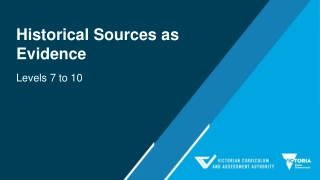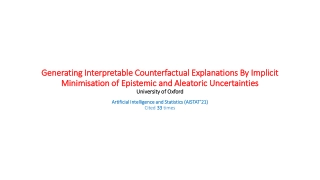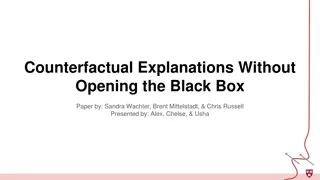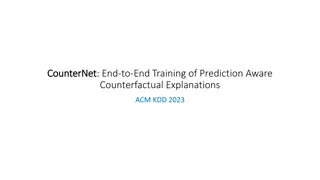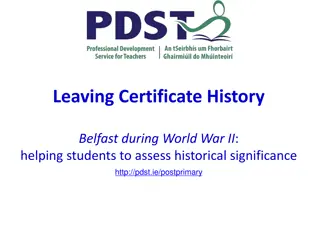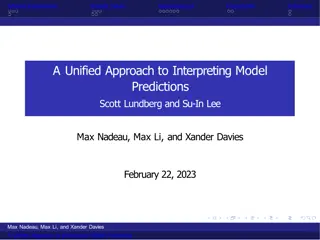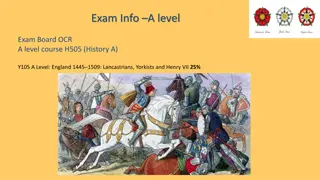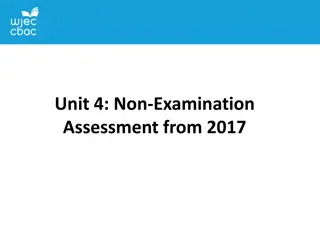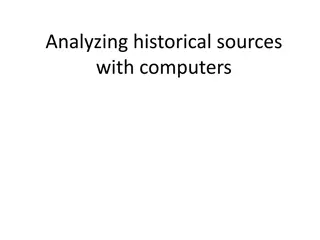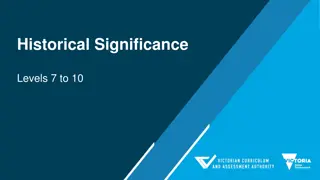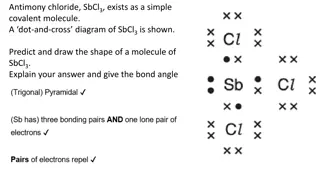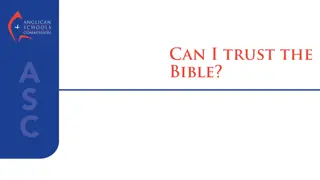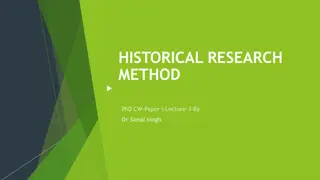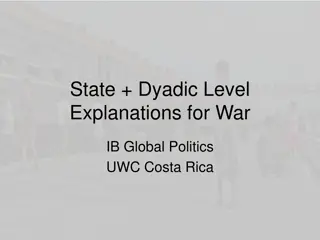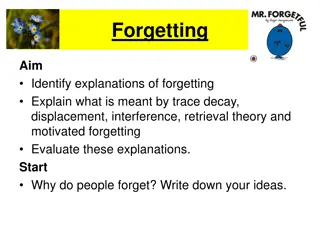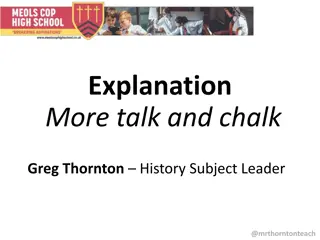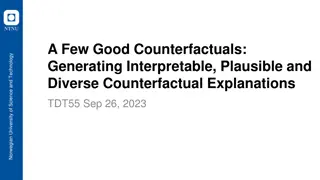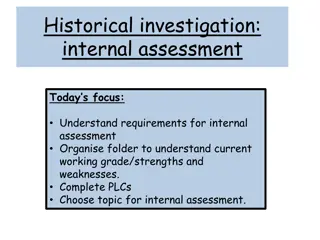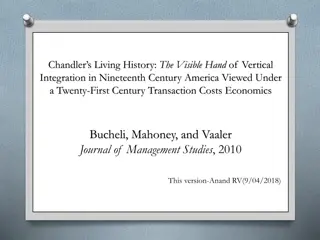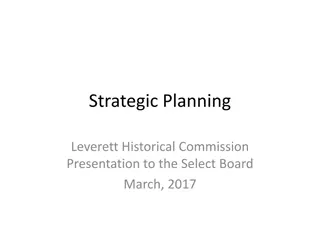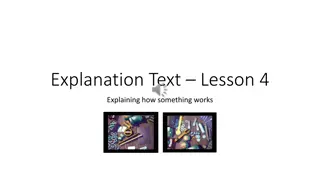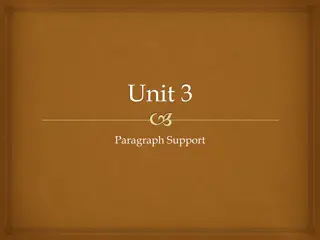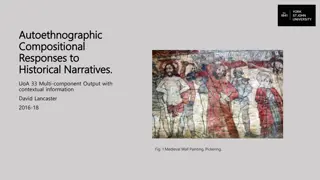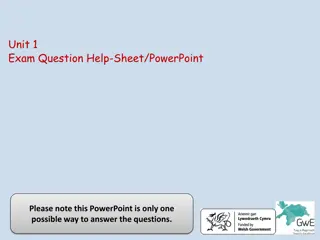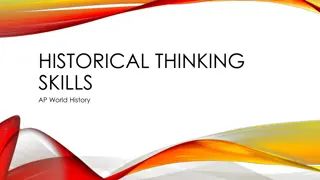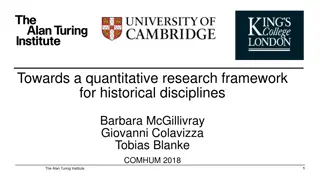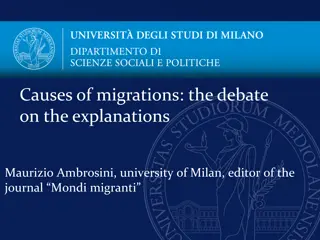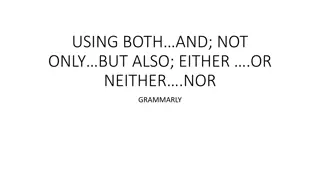Historical Sources as Evidence
Explore the importance of historical sources as evidence in the Victorian Curriculum History context, focusing on how students analyze, evaluate, and utilize sources to create historical explanations and arguments. Discover the significance of primary and secondary sources, perspectives of historica
1 views • 46 slides
Enhancing Counterfactual Explanations for AI Interpretability
Explore how to improve interpretability of AI models through generating counterfactual explanations with minimal perturbations and realistic, actionable suggestions. Addressing limitations of current methods and the need for a more flexible generative framework to ensure explanations are clear, conc
5 views • 13 slides
Exploring Counterfactual Explanations in AI Decision-Making
Delve into the concept of unconditional counterfactual explanations without revealing the black box of AI decision-making processes. Discover how these explanations aim to inform, empower, and provide recourse for individuals impacted by automated decisions, addressing key challenges in interpretabi
1 views • 25 slides
CounterNet: End-to-End Training for Prediction-Aware Counterfactual Explanations
CounterNet presents an innovative framework integrating model training and counterfactual explanation generation efficiently. By training the predictive model and counterfactual generator together, CounterNet ensures improved validity of explanations at a lower cost. This approach enhances convergen
0 views • 17 slides
Challenges and Solutions in Implementing Historical Competencies in Teaching
Explore the complexities and obstacles faced in implementing historical competencies in teaching, as discussed by Jens Aage Poulsen, a senior lecturer and researcher at HistoryLab, University College Lillebaelt, Denmark. The content delves into competence-based curriculum, core historical competenci
0 views • 7 slides
Exploring Historical Significance of Belfast During World War II
Assisting students in assessing the historical significance of Belfast during World War II through an enquiry-focused approach. The content covers key aspects such as the impact of World War II on Belfast, its strategic importance, political leadership, the Belfast Blitz of 1941, and key terms relat
0 views • 32 slides
A Unified Approach to Interpreting Model Predictions
Unified methodology for interpreting model predictions through additive explanations and Shapley values. It discusses the relationship between Additive Explanations and LIME, introduces Shapley values, approximations, experiments, and extensions in model interpretation. The approach unifies various
1 views • 21 slides
Wars of the Roses (1445-1461): Source Analysis on the Downfall of Henry VI
This content delves into the Wars of the Roses period (1445-1461) in England, focusing on the outbreak of conflicts, political turmoil, and the downfall of Henry VI. It includes an inquiry topic, sample paper question, and a detailed analysis of a historical source (Source A) by Jack Cade regarding
0 views • 16 slides
Exploring Historical Fiction: Elements and Examples
Discover the essence of historical fiction, its key elements, and examples like "Forrest Gump." Learn how plausibility and interpretation play pivotal roles in creating captivating narratives that blend fiction with historical events.
0 views • 11 slides
Unit 4: Non-Examination Assessment Overview
The Unit 4 Non-Examination Assessment from 2017 focuses on working as a historian, with tasks including source evaluation and discussion of different historical interpretations. The assessment is marked out of 40 and is worth 20% of the qualification. It assesses knowledge, understanding, source ana
1 views • 14 slides
Exploring Historical Analysis with Digital Tools
Delve into the world of historical analysis using digital methods like digitization, metadata, OCR, and balancing challenges. Discover how tools like Antconc can aid in machine-driven inquiries, statistical analysis, and more to extract valuable insights from historical sources.
0 views • 13 slides
Comprehension Questions for Chapter 21: Answers and Explanations
Answers to comprehension questions for Chapter 21 along with explanations. Topics covered include Lil's perception of her Grandad, the entrance to the tomb, drawing on the rock, relationships between characters, and Mr. Carter's actions. Each answer is supported with references to the text.
0 views • 12 slides
Understanding Historical Significance in Victorian Curriculum History
Exploring historical significance levels 7 to 10 in the Victorian Curriculum History, this content delves into the importance of evaluating the past, identifying patterns of change, and assessing the influence of individuals and groups. Students learn to analyze causes, effects, motives, and interpr
0 views • 48 slides
Chemical Bonding Concepts and Structures Explanation
Explore the concepts of chemical bonding through dot-and-cross diagrams for molecules like Antimony Chloride (SbCl3) and Boron Tribromide, along with explanations on ionic lattice structures, covalent bonds, and electrical conductivity in substances like Aluminium Fluoride (AlF3). Understand the sha
0 views • 9 slides
Examining the Reliability of Historical Texts: From The Bible to Socrates
Investigating the unparalleled popularity of the Bible, the historical significance of Christianity, the reliability of documents related to Socrates, and the critical analysis of potential mistakes in historical texts through comparisons and archaeological findings.
2 views • 13 slides
Understanding Historical Research Methods
Historical research is a systematic approach to investigating past events, developments, and experiences. It involves critical examination of evidence, interpretation of sources, and tracing of historical trends to gain insights into social changes. Various definitions by scholars like Kerlinger, Wh
1 views • 21 slides
Examining State-Level and Dyadic Explanations for War in Global Politics
Understanding the reasons why certain states are more war-prone than others involves exploring factors such as economy, internal opposition, and political systems. Marxist explanations argue that capitalist economies are more prone to war due to issues like overproduction, wealth inequality, and imp
0 views • 17 slides
Understanding Historical Research: Methods, Purposes, and Aims
Historical research involves investigating past events systematically to provide a dynamic explanation, interpretation, and understanding of the past. It aims to uncover unknown aspects, answer unexplored questions, and link past happenings to the present to enrich human culture and encourage interd
0 views • 20 slides
Comprehension Questions for Chapter 10 - Answers and Explanations
Providing detailed answers and explanations to comprehension questions for Chapter 10, including discussions on Lil's feelings, Mrs. Mendoza's intentions, and the significance of the boy label in the suitcase.
0 views • 9 slides
Understanding Chemistry through Open-Ended Questions
The content provides a detailed assessment of student responses to open-ended chemistry questions related to hydrogen peroxide and its applications in teeth whitening gels. Various student answers are analyzed based on their understanding of the chemistry concepts involved, with explanations given f
1 views • 18 slides
Exploring Explanations of Forgetting in Memory
This content delves into various explanations of forgetting in memory, such as trace decay, displacement, interference, retrieval theory, and motivated forgetting. It discusses why people forget and evaluates these theories. Additionally, it explores the Multi Store Model of Memory and concepts like
0 views • 74 slides
Enhancing Teacher-Led Instruction through Effective Explanation Strategies
Extensive research highlights the benefits of teacher-led instruction, emphasizing the importance of clear explanations, strong subject knowledge, credibility, concise design, examples & analogy, storytelling, and chances to elaborate. The six keys to great explanation include subject expertise, cre
0 views • 12 slides
Enhancing Counterfactual Explanations for Improved Understanding
This article explores the concept of generating interpretable, diverse, and plausible counterfactual explanations within explainable AI (XAI). It highlights the challenges with current methods, introduces an instance-guided approach, and emphasizes the importance of good counterfactuals. The discuss
0 views • 22 slides
Requirements for Historical Investigation Internal Assessment
Understand the 25% weightage internal assessment comprising 3 sections for a historical investigation. Focus on source evaluation, investigation, and reflection within a 2,200-word limit. Choose a historical topic, analyze primary and secondary sources, and consider causation, consequence, continuit
0 views • 18 slides
Understanding Historical Context in Skills Development Discourses
Exploring the evolution of apprenticeship and skills development through historical sociology, historical futures, modes of justification, and complexity concepts. Emphasizing the importance of nuanced historical understanding to navigate contemporary challenges in South Africa's skills development
0 views • 29 slides
Evolution of Organizational Forms in Historical Perspective
The study delves into the evolution of organizational structures through the lens of transaction cost economics (TCE) and historical legacies, analyzing the transition from putting-out systems to inside contracting. It highlights the challenges of monitoring, shirking, and transaction costs faced by
1 views • 13 slides
Enhancing Learning with Panopto: A Visual Overview
Explore how Panopto, a versatile software available from GVSU e-learning site, facilitates video capture of instructors or computer screens for detailed explanations. Discover the benefits of using Panopto for illustrating the big picture with Lightboard and drilling down into fine details. Utilize
0 views • 7 slides
Leverett Historical Commission Strategic Planning Presentation Overview
Leverett Historical Commission identifies issues with ad hoc requests, lack of clarity on historical property significance, and inadequate maintenance plans. A strategic plan is needed to define assets, determine significance, create guidelines, prioritize restoration efforts, and establish funding
0 views • 9 slides
Mastering the Art of Explanation: Vocabulary and Structure
Equip yourself with the essential vocabulary and sequence to provide clear explanations using time conjunctions, chronological order, and technical vocabulary. Practice explaining the workings of familiar objects like bicycles and toasters with precision and impersonal language. Evaluate and compare
0 views • 9 slides
5th Grade Mathematics Performance Event Item Analysis
In this presentation, students are assessed on their understanding of mathematical concepts through a 5th grade performance event item involving lemonade quantities. The scoring guide outlines criteria for earning 3, 2, or 1 points based on accuracy of calculations and explanations. Student work sam
0 views • 10 slides
Understanding Quantifier Spreading in Children
Researchers at Katalin Kiss & Tam.s Z.tnyi Research Institute for Linguistics of the Hungarian Academy of Sciences explore the phenomenon of quantifier spreading in children, where they are misled by ostensive cues. The study discusses classic spreading, underexhaustive search, theories of quantifie
0 views • 26 slides
Techniques of Paragraph Support
The techniques of paragraph support involve giving details, explanations, examples, anecdotes, and using facts/statistics to assert and demonstrate the main idea effectively. Providing specific points and meaningful explanations can help make your writing more engaging and believable. This comprehen
0 views • 24 slides
Exploring Historical Narratives through Music and Art
This submission presents two original compositions that delve into historical narratives through a unique blend of music and visual art. The compositions aim to reinterpret stories from the past, creating innovative structures and forms. By intertwining various perspectives and utilizing cinematic t
0 views • 8 slides
Historical Source Analysis Exam Questions Overview
The provided content outlines exam questions related to historical sources, guiding students on analyzing, evaluating, and interpreting information from different sources. The questions cover a range of topics such as learning from sources, assessing accuracy, understanding significance, and making
0 views • 12 slides
Developing Historical Thinking Skills in AP World History
AP History classes aim to cultivate apprentice historians by fostering historical thinking skills (HTS). These skills include Chronological Reasoning, Comparison and Contextualization, Crafting Historical Arguments, and Historical Interpretation. Each skill set equips students with the ability to an
0 views • 15 slides
Quantitative Research Framework for Historical Disciplines
Scholarly communities in historical disciplines are combining quantitative and qualitative methods to study phenomena that change over time. The proposed general methodological reflection aims to enhance research in historical linguistics through quantitatively driven models and claims. Quantitative
0 views • 18 slides
Java Programming Exercises Week 1 to Week 4 Solutions
Solutions and explanations for Java programming exercises from Week 1 to Week 4. Includes code fragments, explanations of Java variable names, calculations, error corrections, user input, and more.
0 views • 28 slides
8th Grade STAAR Review Questions on American History
The content provides a set of STAAR review questions for 8th-grade students covering American history from 1607 to 1877. Questions include events in chronological order, historical periods, and interpretations of key historical concepts like Manifest Destiny and the United States Constitution. Stude
0 views • 90 slides
Debates on Migration Causes: Macro vs. Micro Explanations
Causes of migration are debated between macro-structural and micro-subjective perspectives. Macro explanations focus on push factors like overpopulation and poverty, while micro explanations view migration as rational choices. The debate also includes meso-social factors such as migrant networks and
0 views • 13 slides
English Grammar Rules Using Both And, Not Only But Also, Either Or, Neither Nor
Learn the grammar rules involving using both and, not only but also, either or, neither nor with examples and explanations. Understand the usage of plural and singular verbs, past, present, and future tenses, and the use of do, does, has, have in sentences. Enhance your English language skills throu
0 views • 8 slides
